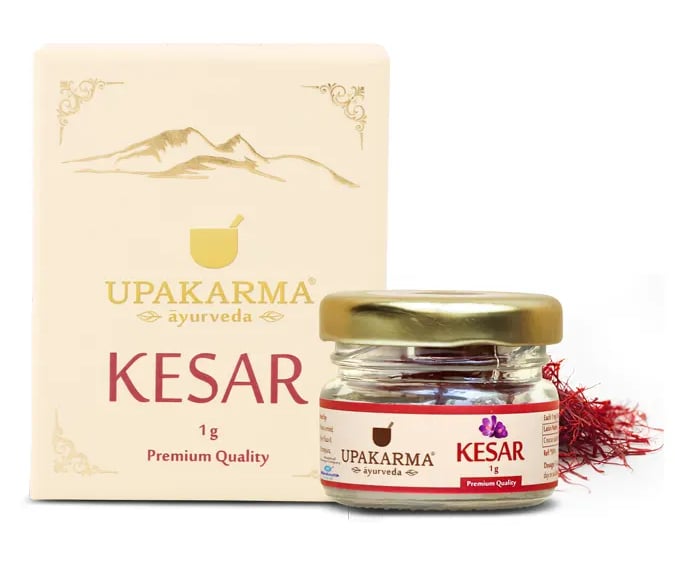Kesar: World's Most Precious Spice
MOOD ENHANCEMENTANTI OXIDANTANTI INFLAMMATION


Saffron, known as "kesar" in Hindi, is a highly prized spice derived from the Crocus sativus flower. Renowned for its vibrant color, distinct aroma, and unique flavor, saffron has been an integral part of culinary traditions, traditional medicine, and cultural rituals for centuries. Beyond its culinary applications, saffron offers a multitude of health benefits, supported by modern scientific research.
Historical and Cultural Significance
Originating in ancient Persia, saffron has a rich history spanning over 3,000 years. It has been utilized in various cultures for its medicinal properties, as a dye, and as a key ingredient in culinary delights. In traditional Indian Ayurvedic medicine, saffron is revered for its therapeutic attributes, believed to balance the body's doshas and promote overall well-being.
Nutritional Profile
Saffron is a powerhouse of essential nutrients and bioactive compounds. It contains an array of antioxidants, including crocin, crocetin, safranal, and picrocrocin, which contribute to its health-promoting properties. These antioxidants play a crucial role in neutralizing harmful free radicals, thereby protecting the body from oxidative stress and inflammation.
Health Benefits of Saffron
1. Antioxidant and Anti-Inflammatory Properties
The rich antioxidant content in saffron helps combat oxidative stress, which is linked to various chronic diseases. Compounds like crocin and crocetin have demonstrated significant free-radical scavenging activity, reducing inflammation and potentially lowering the risk of chronic conditions.
2. Mood Enhancement and Antidepressant Effects
Saffron has been nicknamed the "sunshine spice" not only for its color but also for its potential mood-lifting properties. Studies have shown that saffron supplementation can be as effective as certain conventional treatments for mild to moderate depression, possibly due to its influence on serotonin metabolism.
3. Premenstrual Syndrome (PMS) Relief
Research indicates that saffron may alleviate symptoms of PMS, such as mood swings, irritability, and discomfort. In clinical trials, women who consumed saffron reported a significant reduction in PMS symptoms compared to those who received a placebo.
4. Aphrodisiac Properties
Saffron has been traditionally used to enhance libido and sexual function. Modern studies support this use, showing that saffron supplementation can improve sexual desire and reduce sexual dysfunction in both men and women.
5. Weight Management
Saffron may aid in weight loss by curbing appetite and reducing snacking frequency. Some studies suggest that saffron extract can help decrease body mass index (BMI) and total fat mass, making it a valuable addition to weight management strategies.
6. Cardiovascular Health
The antioxidant and anti-inflammatory properties of saffron contribute to heart health. Saffron has been found to lower blood pressure, reduce cholesterol levels, and prevent the clogging of arteries, thereby reducing the risk of heart diseases.
7. Blood Sugar Regulation
Emerging research suggests that saffron may improve insulin sensitivity and lower blood sugar levels, offering potential benefits for individuals with type 2 diabetes. These effects are attributed to saffron's antioxidant compounds, which help in reducing oxidative stress and inflammation associated with diabetes.
8. Vision Health
Saffron appears to have protective effects against age-related macular degeneration (AMD), a leading cause of vision loss in older adults. Studies have shown that saffron supplementation can improve retinal function and visual acuity in individuals with AMD.
9. Cognitive Function and Neuroprotection
The bioactive compounds in saffron, particularly crocin, have demonstrated potential in enhancing memory and cognitive function. Research indicates that saffron may help in the management of neurodegenerative conditions like Alzheimer's disease by inhibiting the aggregation of amyloid-beta proteins and reducing neuronal damage.
10. Anti-Cancer Potential
Preliminary studies suggest that saffron and its constituents may possess anti-cancer properties. Compounds like crocin have been shown to inhibit the growth of cancer cells and induce apoptosis (programmed cell death) in various cancer types, including colorectal, breast, and prostate cancers. While these findings are promising, more extensive clinical trials are needed to confirm saffron's efficacy in cancer prevention and treatment.
Incorporating Saffron into Your Diet
Saffron's unique flavor and aroma make it a versatile ingredient in various cuisines. Here are some ways to include saffron in your diet:
Culinary Uses: Add a pinch of saffron threads to dishes like biryanis, paellas, risottos, and stews to impart a rich color and distinct flavor.
Beverages: Infuse saffron in warm milk or tea for a soothing drink.
Desserts: Incorporate saffron into sweets like kheer (rice pudding), ice creams, and cakes for an exotic touch.
To extract maximum flavor and benefits, soak saffron threads in warm water or milk for a few minutes before adding them to your recipes.
Safety and Precautions
While saffron is generally safe for most people when consumed in culinary amounts, it's essential to exercise caution with supplementation. High doses of saffron (more than 5 grams per day) can be toxic and may cause adverse effects such as nausea, dizziness, and dry mouth.


iyurvedik elements
Longevity Ayurveda. Live Your Best Life
Connect
info@iyurvedik.com
© 2025. All rights reserved.
Disclaimer: If you have an acute or chronic disease, please seek medical attention from a qualified doctor. Although the Ayurvedic principles and practices presented here are beneficial in most cases, they should not be used as a means of clinical diagnosis or treating pathological conditions. Ayurvedic lifestyle is an excellent adjunct to all forms of medical care, but it is not a substitute for professional care from a physician.
